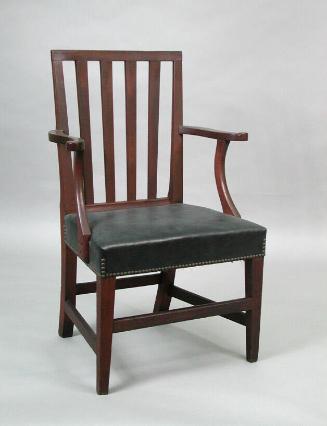Side Chair
Original OwnerOriginally owned by
Simeon Goodrich
(American, 1762 - 1847)
Furniture MakerMade by
Unknown
Date1800-1815
MediumMahogany, horsehair cloth, brass nails
DimensionsPrimary Dimensions (overall height x width x depth): 35 5/8 x 20 1/4 x 19 3/16in. (90.5 x 51.4 x 48.7cm)
ClassificationsFurniture
Credit LineGift of George H. Gilman, Jr.
Object number1983.101.5
DescriptionMahogany side chair in the Federal, or early neoclassical, style, with a flat crest rail, three banisters, tapered front legs, and horsehair over-the-rails upholstery. The back of the chair is formed by a straight crest rail atop two stiles; the stiles are raked, or angled, together slightly from top to bottom. Three vertical banisters are evely spaced below the crest rail. Each banister is pierced and carved; the center of each banister splits in half and widens to a patera, or ribbed oval. The banisters are joined at the bottom to a rectangular stay rail. Above the seat, each stile is slanted backwards. Below the seat, each stile forms a backward-curving leg that slants toward the center back of the chair. The seat is trapezoidal, with black horsehair over-the-rails upholstery (replaced) that is held in place with a swagged line of brass nails (replaced) on the front and side seat rails. The tapered front legs extend from the height of the seat down to the foot. The back and sides of the chair each have a stretcher connecting the lower portion of the legs. A medial stretcher connects the two side stretchers.
Condition: The front legs are lightly scratched and worn. The upholstery and brass nails are replaced.
Design and Construction Details:
Design. The top and bottom of each banister widens slightly to a semi-circular form. The upper portion of each stile is only about half the width of the back leg; the stile changes width just above the seat. The horizontal and vertical elements of the back of the chair, excluding the banisters, are outlined with cock beading. The front and outer side of each front leg is molded with two wide, recessed flutes, with a thin line of cock beading to each side.
Chair Frame. The crest rail is supported by a tenon at the top of each stile. Above the seat, the back of each stile is rounded. Each banister is tenoned into the crest rail above and into the stay rail below. The stay rail is tenoned into the stiles; the back of the stay rail is rounded. Each seat rail is tenoned into the stiles and into the top of the legs. A diagonal brace reinforces each interior front corner of the seat frame; this may be dovetailed into the front and side stretchers. Each side stretcher and the back stretcher are tenoned into the lower portion of the legs. The medial stretcher is dovetailed to the side stretchers.
Upholstery (replaced). The chair is upholstered with over-the-rails black horsehair. The upholstery is held in place with a row of swagged brass nails (replaced) along the front and side seat rails; the nails follow the original nailing pattern. Below the horsehair is stuffing, sackcloth, and canvas webbing that is tacked directly to the top of the seat rails. The horsehair is wrapped around the bottom of the front and side seat rails and is held in place with small nails.
Condition: The front legs are lightly scratched and worn. The upholstery and brass nails are replaced.
Design and Construction Details:
Design. The top and bottom of each banister widens slightly to a semi-circular form. The upper portion of each stile is only about half the width of the back leg; the stile changes width just above the seat. The horizontal and vertical elements of the back of the chair, excluding the banisters, are outlined with cock beading. The front and outer side of each front leg is molded with two wide, recessed flutes, with a thin line of cock beading to each side.
Chair Frame. The crest rail is supported by a tenon at the top of each stile. Above the seat, the back of each stile is rounded. Each banister is tenoned into the crest rail above and into the stay rail below. The stay rail is tenoned into the stiles; the back of the stay rail is rounded. Each seat rail is tenoned into the stiles and into the top of the legs. A diagonal brace reinforces each interior front corner of the seat frame; this may be dovetailed into the front and side stretchers. Each side stretcher and the back stretcher are tenoned into the lower portion of the legs. The medial stretcher is dovetailed to the side stretchers.
Upholstery (replaced). The chair is upholstered with over-the-rails black horsehair. The upholstery is held in place with a row of swagged brass nails (replaced) along the front and side seat rails; the nails follow the original nailing pattern. Below the horsehair is stuffing, sackcloth, and canvas webbing that is tacked directly to the top of the seat rails. The horsehair is wrapped around the bottom of the front and side seat rails and is held in place with small nails.
Status
Not on view












